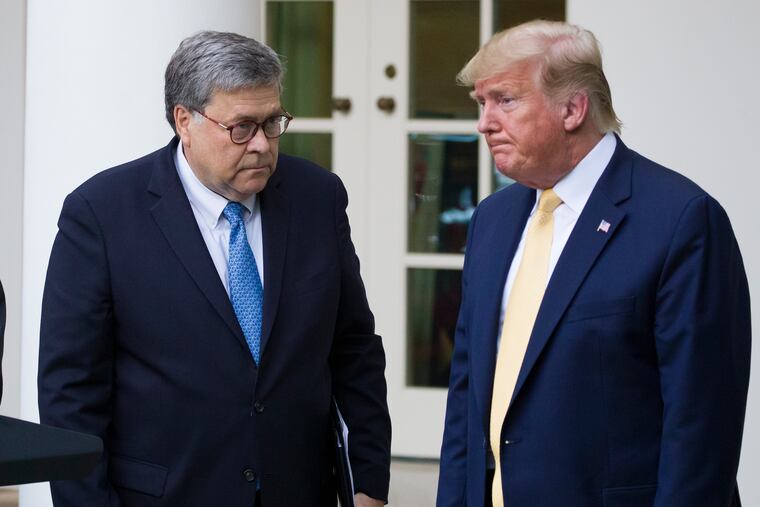Judiciary Committee chairman asks William Barr to permit testimony from Roger Stone prosecutors
The chairman of the House Judiciary Committee asked Attorney General William Barr on Friday to allow the four career prosecutors who quit the criminal case against President Trump's friend Roger Stone to testify before lawmakers as part of an inquiry into possible White House interference.

WASHINGTON - The chairman of the House Judiciary Committee asked Attorney General William Barr on Friday to allow the four career prosecutors who quit the criminal case against President Trump's friend Roger Stone to testify before lawmakers as part of a wide-ranging inquiry into possible White House interference at the Justice Department.
In a letter to Barr, House Judiciary Committee Chairman Jerry Nadler, D-N.Y., wrote that recent events at the Justice Department - including leadership's unusual intervention to reduce career prosecutors' sentencing recommendation for Stone - had been "deeply troubling," and requested Barr turn over communications between the White House and the Justice Department on several politically sensitive cases.
Nadler also asked that Barr make available for testimony or interviews 15 different current and former officials involved in the matters, including the four career prosecutors who until recently handled the Stone case and all the U.S. Attorneys across the country that the Justice Department has recently tapped for special assignments of interest to Trump.
Barr himself is scheduled to testify before the Judiciary Committee on March 31, and Nadler asked for a response to his letter by March 13.
The Justice Department is generally resistant to providing Congress with White House communications, which could be protected by executive privilege, or with information about ongoing investigations - making it unlikely that Nadler will get much, if any, of what he is seeking. The chairman's request for testimony from low-level line prosecutors, who are not politically appointed, also is unusual and could be met with resistance even within his own party.
Nadler conceded in his letter that the Trump administration's position has been that "the Department typically does not provide information regarding ongoing matters," but he cited recent precedents that show the Justice Department has not always taken that tack.
For example, he wrote, when the Judiciary Committee examined the FBI's investigation of then-secretary of state Hillary Clinton's use of a private email server, as well as the FBI's 2016 opening of an investigation into possible coordination between Russia and the Trump campaign, "the Justice Department made available nearly one million pages of documents, including classified materials, memos describing interactions with President Trump, and electronic communications authorizing investigations into Russian election interference."
Nadler noted that the department also made available 15 current and former Justice Department and FBI employees for interviews, including career officials, for those legislative inquiries.
Barr has faced intense criticism since he personally intervened in the Stone case this month - after Trump tweeted about the matter - to reduce the seven-to-nine year sentencing recommendation that career prosecutors had made to a judge. The move prompted the four prosecutors - Jonathan Kravis, Aaron S.J. Zelinsky, Adam C. Jed and Michael J. Marando - to quit the case, with Kravis leaving government entirely. More than 2,000 former Justice Department officials soon called on Barr to resign in an open letter.
Stone, who had been convicted of lying to Congress as it sought to investigate possible coordination between Trump's campaign and Russia, was ultimately sentenced to three years and four months in prison.
Barr has said he made the decision to intervene before Trump's tweet, and in an ABC News interview, he openly rebuked the president for speaking publicly about Justice Department criminal cases. Barr told ABC News that Trump's comments made it "impossible for me to do my job."
The net effect has been harmful to morale in the department. Many career officials already had viewed Barr - and his predecessor, Attorney General Jeff Sessions - warily for appointing outside U.S. Attorneys to carry out tasks that would seemingly be of political benefit to President Trump.
For example, Barr assigned U.S. Attorney John Durham in Connecticut to investigate how the FBI initiated its 2016 probe into Trump's campaign, and tapped U.S. Attorney Scott W. Brady in Pittsburgh to take information from Trump's personal lawyer, Rudolph W. Giuliani, about what Giuliani sees as wrongdoing by former vice president Joe Biden and his family in Ukraine. In the wake of the Stone sentencing, it was revealed that Barr had also tapped Jeff Jensen, the U.S. attorney in St. Louis, to review and "assist" prosecutors handling the case again Trump's former national security adviser Michael Flynn.
Nadler’s letter called for all of those U.S. Attorneys - and several others involved in similar matters - to be made available to testify.